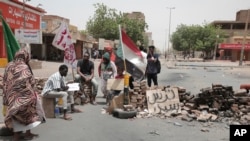Sudan's leading general said Monday the country's military will withdraw from negotiations meant to solve the ongoing political crisis after a coup last year, allowing civil society representatives to take their place.
In televised statements aired on Sudan's state television, General Abdel-Fattah Burhan also promised that he would dissolve the sovereign council that he leads after a new transitional government is formed. The council has governed the country since the military took power in a coup last year.
Since the coup, the U.N. political mission in Sudan, the African Union and the eight-nation east African regional Intergovernmental Authority on Development have been trying to broker a way out of the political impasse. But talks have yielded no results so far. Pro-democracy groups have repeatedly said they will not negotiate with the military, and they have called for it to immediately hand the reins to a civilian government.
Burhan did not specify any dates or who would replace the military at the negotiating table. After the ruling council is dissolved, he said, the army and the powerful paramilitary known as the Rapid Support Forces will be placed under a new governing body responsible for the country's defense and security.
Sudan has been plunged into turmoil since the military takeover upended its short-lived transition to democracy after three decades of repressive rule by former strongman Omar al-Bashir. The military removed al-Bashir and his Islamist-backed government in a popular uprising in April 2019.
Burhan's statements come after a deadly week for the country's pro-democracy protesters. On Thursday, nine people were killed and at least 629 injured by security forces in anti-military demonstrations, according to the Sudan's Doctors Committee, which has tracked protest casualties.
Sudanese military authorities have met the near-weekly street protests since the coup with a crackdown that has so far killed 113 people, including 18 children.
Western governments have repeatedly called on the generals to allow peaceful protests but have also angered the pro-democracy movement for engaging with the leading generals.
Top General Says Military to Leave Sudan Political Talks

Cairo —








